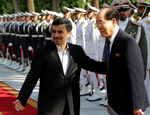 Wall Street Journal: Obama administration officials are raising alarms about a scientific-cooperation pact between North Korea and Iran that officials said could advance the nuclear and missile programs of both countries.
Wall Street Journal: Obama administration officials are raising alarms about a scientific-cooperation pact between North Korea and Iran that officials said could advance the nuclear and missile programs of both countries.
The Wall Street Journal
By JAY SOLOMON
 WASHINGTON—Obama administration officials are raising alarms about a scientific-cooperation pact between North Korea and Iran that officials said could advance the nuclear and missile programs of both countries.
WASHINGTON—Obama administration officials are raising alarms about a scientific-cooperation pact between North Korea and Iran that officials said could advance the nuclear and missile programs of both countries.
The agreement, reached in September, bears a close resemblance to one North Korea signed with Syria in 2002, U.S. and United Nations officials said, just as Pyongyang began secretly constructing a plutonium-producing nuclear reactor in eastern Syria. “They have pretty much the same wording,” said Olli Heinonen, a former lead weapons inspector at the U.N. nuclear watchdog agency.
The U.S. is paying new attention to the pact after recent North Korean nuclear and missile tests, at a time when Tehran has come closer to producing enough enriched nuclear fuel for a bomb, U.S. officials said. Washington is concerned that the two military allies will seek to use the agreement to advance their nuclear capabilities, just as they have jointly developed missile systems, according to U.S. and U.N. officials.
“Any ‘scientific cooperation’ between Iran and North Korea is potentially a source of real concern to us, and we’ll have to follow it closely,” said a senior U.S. official on Friday.
This year, Pyongyang conducted its third nuclear-weapons test, and for the first time successfully launched a long-range missile into space. Iran hasn’t developed an atomic bomb, and says it has no nuclear-weapons program, despite U.S. accusations to the contrary.
The signing of the agreement, in Tehran in September was attended by Iranian President Mahmoud Ahmadinejad and North Korea’s No. 2 official, Kim Yong Nam, according to Iranian state media. Mr. Kim also led the 2002 delegation to Syria.
U.S. and European officials are particularly concerned about the presence at the Tehran signing of the head of the Atomic Energy Organization of Iran, Fereydoun Abbasi-Davani. The U.N. placed sanctions and a travel ban on Mr. Abbasi-Davani in 2007, on what it said was evidence he was involved in nuclear-weapons research.
Iranian state media reports don’t specify cooperation with North Korea on developing nuclear technologies. But they do cite the establishment of joint laboratories, exchanges of Iranian and North Korean scientists, and technology transfers in the areas of energy and information technology.
“The Islamic Republic of Iran and North Korea have common enemies since the arrogant powers can’t bear independent governments,” Iran’s Supreme Leader Ayatollah Ali Khamenei told Mr. Kim during his stay, according to the official FARS news agency.
Iran and North Korea began military cooperation during Iran’s eight-year war with Iraq in the 1980s. Pyongyang supplied light arms and artillery at a time of an international arms embargo on the Islamic Republic.
Since then, North Korea has emerged as a principal supplier of missile components to Tehran, U.S. and U.N. officials said. Iran’s medium-range Shahab-3 missile is based on the design of North Korea’s Nodong-1.
Washington and the U.N.’s nuclear watchdog, the International Atomic Energy Agency, have long been concerned that Pyongyang could also begin sharing nuclear technologies with Tehran, according to U.S. and U.N. officials.
North Korea could provide Iran with a range of supplies for its nuclear program, including uranium ore, centrifuge machines and enriched uranium, according to these officials. Pyongyang also is seen as being ahead of Iran in developing the technologies needed to place an atomic warhead on a missile.
“North Korea is hardly short of credible means of delivering nuclear weapons via missiles, all of which are for sale today in the Middle East,” said David Asher, a former State Department official, in testimony this week before House Foreign Relations Committee.
Kim Yong Nam also led a delegation to Syria in 2002 to sign an agreement for scientific cooperation with President Bashar al-Assad’s government, according to Syrian state media. The pact also called for the “exchange of expertise” and the “joint use of scientific research equipment.”
The U.S. and the IAEA believe that in the months after this agreement was signed Pyongyang stepped up efforts to assist Mr. Assad’s government in building a nuclear reactor on the Euphrates River in eastern Syria. The facility, near the city of Dair Alzour, was seen as a replica of North Korea’s Yongbyon nuclear reactor, which the North has used to extract the plutonium used in its atomic weapons.
U.S. officials said the Syrian reactor was nearly operational when Israeli jets bombed the facility in 2007. A number of North Korean engineers were believed to have been killed at the reactor site.


